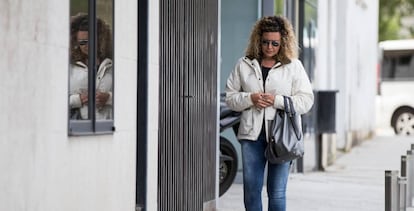The media circus around Diana Quer’s family
Media transformed the private life of the Quer family into an explosive soap opera


The investigation into the disappearance of Diana Quer got tangled in her mother’s parties “with men.” There was also the “dark episodes” in the family in which Diana’s father yelled “whore, bitch” at her mother, his ex-wife. Diana’s mother was seen entering a mysterious “blue house” next door to where the missing teen’s mobile telephone was found. A neighbor of the Quer family provided “very valuable” information which was shared with the mayor, who said it “could change the direction” of the investigation.
The mother of Diana Quer told her to “take an Orfidal [a tranquilizer]”. A fortune teller announced that the teen was still in A Pobra, the Galician village where she went missing: “She never left there.” The association for missing people SOS Desaparecidos shared images of her allegedly in Serbia, Croatia and Romania, and in each country she could have changed her physical appearance. A handwriting expert said that Diana Quer was immature and had low self-esteem.
They made mistakes, human mistakes ... Perhaps everyone should have been more understanding. Supporter of Diana's father
She smoked, drank and hung out with dangerous guys. The children in the Quer family had fights with their parents and with one another. There was a fight inside a clinic. Possible abuse. When Diana left home, three days could pass before her mother heard from her again. But when Diana disappeared, her mother immediately called the Civil Guard. Her 15-year-old sister Valeria fell in love and went on a trip to Africa. Diana’s mother could be linked to the father of an ex-girlfriend of Spanish media personality Paquirrín. During parties in A Pobra, Diana Quer made out with a guy she didn’t know. “The Quers’ life of luxury” one article was titled.
It was all either untrue or unnecessary, a collection of horrors published and spread using the tragedy as an excuse. In 500 days, there were only three newsworthy stories in the Diana Quer case: her disappearance, the discovery of her cellphone and the detention of the main suspect along with the discovery of her body. However, media attention has been exhaustive throughout this time.
Without culprits, the spotlight quickly turned to the family of the victim, with any real or invented incident considered worthy of analysis, and fueling all class of special guests who believed they had relevant information. It transformed their lives into a kind of reality show, elaborated with love stories, holidays and public fights between members of the family who became public figures thanks to the dramatic circumstances. All in the looming absence of Diana Quer, a fact that tended to give a second meaning to each story or piece of information.
An old friend of the family concluded: “I remember in Spain when these kinds of celebrities became famous for sleeping with singers or bullfighters. But now you have to get your daughter killed to reach that kind of fame.” This is the man that shared something revealing about the first days after Diana Quer’s disappearance. It happened on August 31, 2016, when Diana’s father said something that he would regret that very night and many times again both in private and in public. That day, a judge took away from his ex-wife Diana López-Pinel custody of their other daughter. Nine days had passed since Diana’s disappearance and her father, upon receiving the custody news, regretted that it was “too late.” The public display of harmony was blown apart.
Without culprits, the spotlight quickly turned to the family of the victim, with any real or invented incident considered worthy of analysis
The disappearance of a young, pretty girl from a rich family (Missing white woman syndrome, it is called in the United States) now had the final ingredient to transform the private life of the Quer family into an explosive soap opera. “If only our own 'disappeared' had received just a tenth of the attention given to Diana,” Luis Arroyo, Juan Carlos Quer’s communication consultant, was told by relatives of other missing persons in a meeting attended by Spanish journalist Paco Lobatón. The attention was intense from day one, but after Diana’s parents broke the image of cordiality, public interest and media response rose to unprecedented levels.
“It’s about two people who had never been in front of a camera before, who had gone for days without knowing where their daughter was, who were going through a long and traumatic divorce. They were nervous as we can imagine. And they made mistakes, human mistakes and in how they communicated. Perhaps everyone should have been more understanding. As soon as they appeared somewhere, audience ratings jumped up,” said a supporter of Juan Carlos Quer recently.
Proof of this monumental misdirection is when the father of Diana tried to stop the media from prying into the family’s private life and his lawyer, with complete goodwill, proposed organizing a large press conference to announce that he would not be speaking again. For her part, the mother of Diana, seeing what was coming, warned: “My child would not think well of any of this,” as issues completely unrelated to the disappearance made headlines.
A year and a half after writing that Diana’s mother’s “parties with men” were hindering the investigation, the same news outlet criticized the media circus surrounding Diana and called for more responsibility from television programs which allow all species of gimmicks and forget that when nothing true can be said, the best option is silence.
English version by Melissa Kitson.
Tu suscripción se está usando en otro dispositivo
¿Quieres añadir otro usuario a tu suscripción?
Si continúas leyendo en este dispositivo, no se podrá leer en el otro.
FlechaTu suscripción se está usando en otro dispositivo y solo puedes acceder a EL PAÍS desde un dispositivo a la vez.
Si quieres compartir tu cuenta, cambia tu suscripción a la modalidad Premium, así podrás añadir otro usuario. Cada uno accederá con su propia cuenta de email, lo que os permitirá personalizar vuestra experiencia en EL PAÍS.
¿Tienes una suscripción de empresa? Accede aquí para contratar más cuentas.
En el caso de no saber quién está usando tu cuenta, te recomendamos cambiar tu contraseña aquí.
Si decides continuar compartiendo tu cuenta, este mensaje se mostrará en tu dispositivo y en el de la otra persona que está usando tu cuenta de forma indefinida, afectando a tu experiencia de lectura. Puedes consultar aquí los términos y condiciones de la suscripción digital.








































